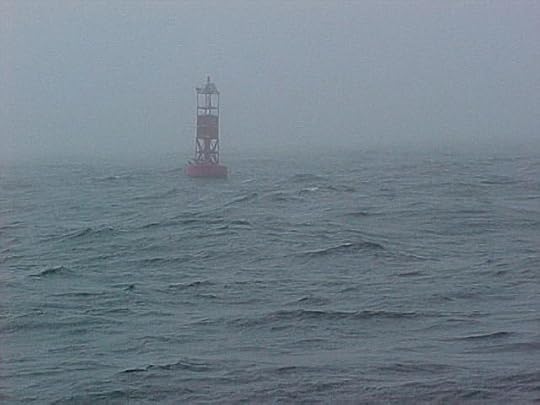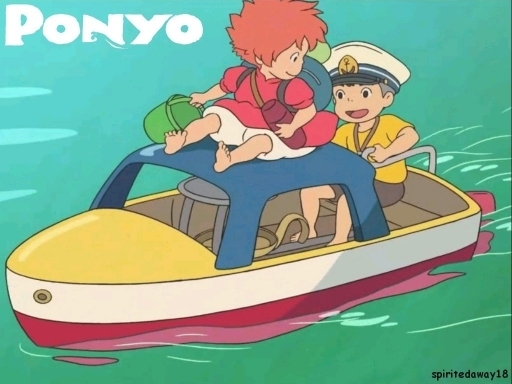Mike Jastrzebski's Blog, page 71
January 23, 2012
Running into the wind
By Rae Francoeur
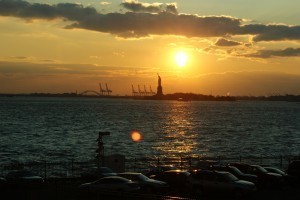
Running along the Hudson River in Manhattan is always exciting. Sometimes you pass celebrities and their personal trainers, sometimes it's the extraordinary view — like the Statue of Liberty — that surprises you.
I don't know what sailors do to pass the winters on the New England seacoast, but runners can keep running. I've got cleats to help stabilize me on the ice, polypropylene base layers to wick sweat and keep in warmth, and a micro-fleece neck warmer to pull up over my nose. If you prefer the outdoors to a treadmill, it's do-able with the right clothing.
I cannot understate the allure of severe weather. If you run along the water, as I do, the probability of severe conditions is all the more likely. But running in perilous conditions is hard to resist. It's a personal badge of courage that feels good.
Once I ran by the new USS New York, made with steel from the collapsed Twin Towers. I boarded, halfway through my run, and toured the ship.
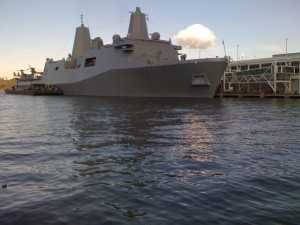
I have two "Rave Runs" — what Runner's World magazine refers to as runs in gorgeous settings — that I take all the time. One is along the Hudson River in Manhattan and the other is around the back shore of Rockport. Depending on where I am, I either run along the ocean or the river. When you make a run in a locale, even just once, you lay claim to it. It becomes so much a part of you that one blink of an eye or one association can put you back there.
Both of my "everyday" runs are beautiful. But both can be tough in winter because of the wind off the water. One time I bailed on a run off Marmion Way in Rockport because the wind off the Atlantic was so strong I felt as if air I didn't want or need was being rammed down my throat. Other times along the Hudson River, the wind gusts have tangled my feet or shot me sideways. You quickly learn to run into the wind on the first leg of your run so you can have the wind at your back for the return trip when you are more tired. I am sure you burn twice the calories running in winter because of the exertion it takes to face down the wind.
Running along the water is dramatic, electrifying and challenging. Sometimes I'm one of the only ones out in inclement weather whereas in summer, I battle crowds of runners, cyclists and skaters on roller blades. On the other hand, I've seen runners in NYC pass me wearing shorts when it's below 20 degrees and the winds are gusting over 30 mph. Their flesh is purple but their faces are impossible to read. They are in the zone.
Today I just finished reading Kittery, Maine, author (and boat-builder) Rodman Philbrick's new e-book, "Listening to Kids in America." He says that he wrote his bestselling "Freak the Mighty" at a time when he was in despair over the "genteel poverty" his writing life afforded him and his wife Lynn. After publishing 12 books with modest sales, "Freak the Mighty" has so far sold more than 2 million copies.
In this new e-book, Philbrick talks about the importance of persistence and stubborn will. We writers all know that talent is important but talent isn't necessarily the key to getting published and making a living as a writer. It's being there every day, in some fashion, and doing it over and over again. It's pulling on the wool cap and heading toward the water, regardless of how you feel.
Rod Philbrick, at his home in Marathon Key, where he boats, fishes and writes each winter.
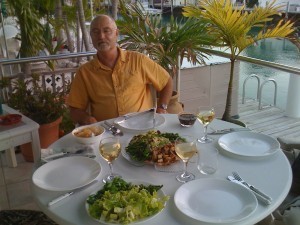
Rod's story, told in "Listening to Kids in America," is remarkable. He persevered in extreme times, again and again, and it paid off. His book was made into the movie "The Mighty" starring an amazing cast including Sharon Stone and Meatloaf, and he went on to write many more award-winning young adult novels. He replies in Rilke-like fashion, and with wit and wisdom, to the heartbreaking and hilarious letters he gets from kids who have been deeply touched by his work. Writers and sailors will love this gift of inspiration.
Writing to publish, like running along the windswept waters of the Northeast in winter, requires a certain fortitude and no small amount of blind faith. There are always payoffs and it's nice to be reminded of them, especially when there's yet another nor'easter bearing down.
Share on Facebook
January 22, 2012
From Rags to Riches: Amazon Prime
By Mike Jastrzebski
If you have not entered any of your Kindle books into the Amazon Prime program, you may be losing out. I entered The Storm Killer in the program last month and found that I had a bump in sales and I had a dozen books downloaded through the Prime lending program. Amazon paid $1.70 per book for books lent so I made a few extra dollars and sold a few more books. The cost? You have to agree not to sell your books through any other eBook distributors for a three month period. I felt that I came out ahead with The Storm Killer so I signed all of my books up for the program.
in the program last month and found that I had a bump in sales and I had a dozen books downloaded through the Prime lending program. Amazon paid $1.70 per book for books lent so I made a few extra dollars and sold a few more books. The cost? You have to agree not to sell your books through any other eBook distributors for a three month period. I felt that I came out ahead with The Storm Killer so I signed all of my books up for the program.
Another upside of the program is that Amazon allows you to offer your prime books free for up to 5 days per 3 month period. You do not get paid, but it's a good way to get exposure.
I am offerering all of my books for free over the next month. If you haven't read my books here's a chance to read them for free.
The Kindle version of Weep No More is free through today, Monday, January 23rd at Amazon. Dog River Blues (A Wes Darling Mystery) will be free at Amazon from January 26th through the 30th. Key Lime Blues (A Wes Darling Mystery)
will be free at Amazon from January 26th through the 30th. Key Lime Blues (A Wes Darling Mystery) will be free February 2nd through the 4th, and The Storm Killer will be free from February 11th through the 15th.
will be free February 2nd through the 4th, and The Storm Killer will be free from February 11th through the 15th.
Over the next four Mondays I will be posting how many free books I've given away each week and how many books I've sold. So far this month I've been averaging 25 sales per day among all four of my titles. What do you think , will my sales go up or down? How many books will a relatively unknown writer give away? Come back every Monday if you want to know the answer.
By the way, I put Weep No More up for free yesterday, Saturday the 21st. Through midnight Sunday the 22nd I have had 1068 free copies downloaded.
up for free yesterday, Saturday the 21st. Through midnight Sunday the 22nd I have had 1068 free copies downloaded.
Share on Facebook
January 19, 2012
Are sailors really cheap?
I used to belong to a sailing club that met every Thursday night for a social in a local Fort Lauderdale bar. For a while, we met at the Downtowner which was the hang-out for my fictional character Seychelle in my first four novels. That was where the club met until they got thrown out because too many members were not tipping. Apparently the waitresses and bar maids complained to the management about the cheap sailors (not me – the former waitress) and we got kicked out. That was just the beginning. Over the next few years, that sailing club got kicked out of bars more often than I changed the oil on my engine.
Try talking to anyone who ever worked on a fuel dock, and they will tell stories of the average sailor who pulls in and buys about 20 gallons of diesel, dumps his trash, sits on the fuel dock for another hour while he fills his water tank, uses the head, asks for a free pump-out and then leaves without tipping. Compare that to the average power boater who buys 200 gallons of diesel or more and you can easily understand why the blow boats have the reputation they do.
Of course making generalizations is risky, but cruising sailors tend to be more into the DIY – do it yourself lifestyle. We try to do our own maintenance and make our own repairs. Maybe we drop more dollars buying parts because Lord knows, sailboats are not cheap to maintain, but we try our best to avoid hiring mechanics whenever possible. And though we invest thousands into the rigging, we claim the wind is free.
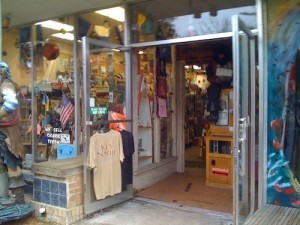 I've been thinking about his ever since I arrived here in Fernandina Beach where I decided to give myself and the Intrepid Seadog Chip a break. I paid up for four nights on a mooring since my arrival across the state line into Florida, and I've been enjoying these days walking the streets of the charming downtown Amelia Island/Fernandina Beach. There are loads of quaint shops that sell all sorts of stuff, some of which is really lovely, but in my current state as a simple-living sailor, I have absolutely no desire to buy. My boat is already too full of stuff. I can see why the local merchants would think of me as cheap because there is really nothing that I either want or need to buy – even though there are two absolutely fabulous bookstores in this village. Call it thrifty, cheap or frugal, the fact is I have shallow pockets these days. Even the books I buy tend to be ebooks priced under $5.00.
I've been thinking about his ever since I arrived here in Fernandina Beach where I decided to give myself and the Intrepid Seadog Chip a break. I paid up for four nights on a mooring since my arrival across the state line into Florida, and I've been enjoying these days walking the streets of the charming downtown Amelia Island/Fernandina Beach. There are loads of quaint shops that sell all sorts of stuff, some of which is really lovely, but in my current state as a simple-living sailor, I have absolutely no desire to buy. My boat is already too full of stuff. I can see why the local merchants would think of me as cheap because there is really nothing that I either want or need to buy – even though there are two absolutely fabulous bookstores in this village. Call it thrifty, cheap or frugal, the fact is I have shallow pockets these days. Even the books I buy tend to be ebooks priced under $5.00.
So, as a writer trying to market my books to sailors, it has been a tough decision as to where I would price my own ebooks. Because CIRCLE OF BONES is a big novel that I spent five years on, I have kept the price at $3.99, and I still consider that a hell of a bargain and I'm hoping that other cheap sailors will concur. But I decided to enroll SEA BITCH, my little collection of four short stories in the Kindle Select program which offers me the opportunity to give it away for free (as a promotion) for a limited number of days. I've set it up for that book to be available on Amazon for free for this entire weekend from January 20-22.
So, if you are a frugal (i.e. cheap) sailor like I am, or just a lover of bargains, I hope you'll take advantage of the opportunity to download these stories for free for the next couple of days. And tell your friends because we're sailors, which means we're cheap – but the benefits are priceless.
Fair winds!
Christine
Share on Facebook
But how did you get here??
C.E. Grundler
Last week I mentioned cruising aboard the little cuddy-cabin my husband and owned back in our twenties. And as I said, we had many good times aboard that boat. But there's one in particular we still laugh about – our arrival at Block Island. It was right after that two-day stop-over in Mystic, and wanting to squeeze in as much time as possible on the island, we departed the Seaport before dawn had begun to tint the horizon. We had our course plotted, the engine was running perfectly, and off we ventured into the darkness.
The passage went smoothly, with nothing but miles of wide, flat rollers while the engine hummed and the blackness gradually gave way to a murky fog-bound grey. We stayed on course, and right on schedule, we reached the red bell buoy marking the entrance to the Great Salt Pond. We motored slowly through the crowded anchorage and made our way to Payne's Dock, where we had a slip waiting at the floating dock with the thirty foot and under crowd. It was still early; the sun was starting to burn away the gloom, people were just beginning to stir, and the fellow on the 28' flybridge Carver we were docking beside paused from his mug of steaming coffee to give us a hand tying up. And then he asked the strangest question.
"How did you get here?"
Huh? I looked to my husband, he looked to me, and we both looked to the boat we'd docked only moments before. The answer seemed fairly self-evident. But maybe not. Carver asked a second time, as though we hadn't understood the question. In reply, I pointed to the boat we were standing in.
But that, it seems, wasn't the answer he was looking for, so this time he rephrased his question. "But the ferries aren't running yet. How did you get here?"
Am I missing something here? My husband and I look at each other, perplexed, and this time I state the obvious: "We came by boat."
Still Carver looked as baffled as us, and finally he elaborated enough to explain his confusion and clear up ours. He said, "But the ferry isn't running this early. How did you find the island?"
Ahhh! That's what he meant. I pointed to the compass and my husband held up the chart.
"Oh," Carver replied. "You know how to use those? We just follow the ferry."
And sure enough, later that day as we hiked around the island and saw the ferry arriving, it was trailed by a small flotilla of boats, much like a duck with ducklings. Apparently, our friend from the docks wasn't the only one who used that method of navigation. And while it may have been a reliable way to get from point A to point B in those pre-GPS days, personally, I'd rather plot my own course to explore new and unfamiliar waters, rather than follow in someone else's wake.
Share on Facebook
January 17, 2012
It's My Job
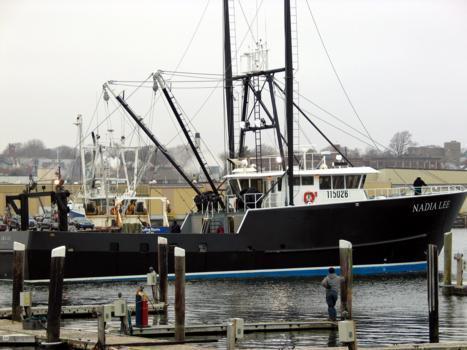
(Scallop boat heading out of New Bedford, MA)
Our house in Rhode Island looks out over the waters where Buzzards Bay meets Rhode Island Sound. In the summer, a steady stream of boats pass several miles offshore on courses between Newport and Martha's Vineyard, and points in between. In the winter months, boat traffic becomes non-existent but for the commercial scallopers who head to and from their fishing grounds.
Simple observation would have me describe these distant vessels as black silhouettes on the horizon. At night, their steel hulls are marked by their shipboard lights – red running lights showing when they are headed fifteen or so miles up the coast to the commercial port of New Bedford, green when they are steaming offshore for George's Bank.
While two craft of the commercial fleet head to sea for commerce on this January day, I am sitting comfortably at my keyboard punching out words for Write On The Water. Although I strive to incorporate authenticity in my writing, I have no special knowledge of what it means to work at sea under these winter conditions. Like most others, I will leave it to my imagination to account for the experience of slipping on the icy deck of a yawing ship as the fully loaded dredge works it way up from the bottom. In some ways, these thoughts leave me, an author who uses the ocean as a backdrop, feeling as an impostor.
Perhaps, though, the work of a writer is different. Several decades ago, Mac McAnally incorporated the line "Now I've been lazy most all my life writin' songs and sleepin' late" into his song "It's My Job." I have no idea how hard Mac does or doesn't work, but I know that McAnally is still singing, still performing, and still writing great songs.
I have deep respect for those who take to the sea despite the season. And I've worked too many long hours in my day job and I've spent too many nights sanding and varnishing in my hobby job to accept any suggestion of laziness. Yet, as far as this writing thing, maybe I do need to accept that the apparent idleness is actually part of the work required of an author. Perhaps this time watching the boats head to sea is simply confirmation that It's My Job.
And as far as the question of Mac McAnally being lazy? Here's a sample of one of his newer songs that illustrates that he's working his own job just right:
*****
Share on Facebook
January 16, 2012
Who's writing this story?
I bought a new laptop recently. I am not computer savvy; I am probably not savvy in anything, but by knowing that about myself, I usually avoid situations where savvy is important or necessary.
I don't name my computer, like some writers I know do. To me the computer is basically a fancy typewriter that corrects my spelling and saves me a lot of trouble when it comes to editing. Transferring files from the old computer to the new one took all Saturday afternoon.
With nothing to do but deal with my frustration, I went to hear my Texas friend Clint Bullard sing.
I was sitting there, enjoying a good cigar and Jameson on the rocks when Art, the GM, came over and says he doesn't believe I don't control what the characters I write about say and do. He got that from one of my blog posts that mentioned characters sometimes take on a life of their own.
"You're like God, you have total control and can do what you want with them," he said, and told Julie my drink was on him.
I love Art and Andy when they do that.
With all the time I've spent in Key West bars – not to mention bars I've enjoyed in other cities I've lived in or traveled to – I would not presume to tell bar managers how to do their job. I say something like that to Art.
"Yeah, but I have a real job, you just write stories, so you don't have bosses or rules to follow," he said with the innocence of one-year old.
I didn't feel it was my responsibility to explain the reality of writing to him, because he wouldn't have believed me. Deal with editors and agents and deadlines, I wanted to say, but didn't. I feared getting into promotion and marketing. I might never have left the bar.
"Let me give you one cryptic example of how characters take on a life of their own," I said instead, as I sipped from my iced Irish whiskey and let its flavor slide down.
"Why does it have to be cryptic?"
"Because I don't wanna give away the story," I had another sip. "If I do, you won't be surprised when you read it."
I relit my cigar, because of too much talking it had gone out. "Early on in one book."
"What's this one called?" He interrupted.
"Free Range Institution."
"Isn't that the title of a Scott Kirby song?"
"Yes it is."
"You're stealing his song title?"
"Art, which topic do you want to discuss here, because the ice is melting and diluting my drink," I chewed my cigar and blew smoke into the air.
"Go on," he sat down, ready for a long story.
"Early on in the new book, there is a conversation about killing people . . ."
"Because you write murder mysteries." He interrupted again.
"Yes, Art, because I write murder mysteries," I said. "The topic is brought up between Mick Murphy, Padre Thomas . . ."
"The Jesuit, right?"
"Yes." I sipped my Irish before it lost too much taste. "And Mick's friend Norm and Tita . . ."
"The spy and the girlfriend." He smiled, proud of remembering my book.
"Very good." I chewed ice from my plastic cup. "You read the proofs."
"Go on, I want to hear your explanation."
"One of the characters mentions taking a life, for any reason has to have an effect on a person, even if that loss of life is justified . . ."
"Has to be Padre Thomas . . ."
"Art, I can't tell you who," I grumbled. "Let me finish."
"Okay." He signaled Julie to refill my drink. Gotta love the guy!
"I wrote the conversation a few months ago, I am at least one-hundred pages more into the story when I begin to wonder about my ending. Someone has to kill the corrupt city commissioner . . ."
"Which commissioner is it?"
"It's fiction, Art," I said. "It's not a real commissioner."
"Yeah, but I bet I can figure out who it is when I read it."
Everyone in Key West sees themselves or someone they know as characters in books by local writers. Just ask Tom Corcoran.
With a deep sigh and fresh drink, I went on. "I'm thinking about the ending when the earlier conversation pops into my head and I think 'what if so-and-so kills the commissioner to save Mick's life,' and pow, I have my ending. I have major conflict and surprise," I puffed on the cigar and sipped the chilled Jameson, proud of myself. "That was not anywhere in my plans for the book," I said. "It came from a conversation I never thought would have anything to do with the ending."
"That's your argument?" He sounded disappointed.
"Yeah," I mumbled, smoked and took a good swallow of my drink. "It happened without my doing it. The character popped out with something from earlier in the book. Something I never gave a thought to, until I looked for an ending."
"You didn't have an ending before you began?" His disappointment was growing.
"I knew how I wanted it to end, but not exactly," I said. "I had my notes, but they're only guides that usually get lost as the pages mount up."
"You aren't going to be mad at me, if I write a mystery, are you?" He stood up. "I can just plot something out and write it. I wouldn't let characters tell me what to do. That's why it takes you so long to write a book."
"I tell you what, I'll trade places with you," I said. "You write the book and I'll take your GM position."
"No, I'm not sure you could handle real work." He began to walk away. "But thanks for the insight, it was a lot of help."
As Art walked away I could almost see him formulating his future novel in his head. I smiled to myself and wondered if God ever had days like this.
I sipped my drink and listened to Clint sing a few of his original songs and thought maybe I should become a songwriter; it sure looked easy as he performed on the outdoor stage, people singing along and yelling for more. Hell, how many words in a song? I can write short stories and novels, how hard can it be to write a song?

Michael at Schooner Wharf Bar
Share on Facebook
January 15, 2012
About Write on the Water
By Mike Jastrzebski
I started Write on the Water nearly two years ago with the idea of sharing my experiences with self publishing my books, and my experiences with cruising and living on a boat.
Christine Kling joined me on the blog before I even entered my first post. Christine was followed by Victoria Allman, Tom Tripp, Joyce Holland, John Urban, C.E. Grundler, Michael Haskins, Richard Jordan, and Wally Moran. Along with our regular contributors, we have enjoyed blogs written by many guest bloggers.
All of our contributors have shared their knowledge without pay, and I would like to take this time to thank them one and all for their posts.
I also want to thank all of our readers. We appreciate any comments you may have to offer. Unfortunately, over the last couple of weeks we have had a couple of nasty attack comments posted by anonymous readers and directed toward two of our bloggers. I sent those comments to the spam folder.
I love to read comments, we all do. All I ask of you the reader, is that they be as respectful of our writers as their postings are to the reader. Feel free to disagree, but please keep it civil.
Our writers try to respond to all comments, so if you enjoy a particular posting leave a comment and let's start a dialogue. Remember, dialogue is good, nasty is spam.
Share on Facebook
It's Boat Show Season!
Boat shows are like candy stores to a chocoholic – you just can't help but want to buy all those sweet looking goodies you see. For a boating writer however, boat shows are an entirely different phenomenon.
Sure, we want to buy everything we see – we're not immune by any means, but there's more to a boat show than engaging in a feeding frenzy like sharks crazed by blood in the water. Mind you, not a few wives would dispute that statement when watching their husbands at a show, but I digress here.
As a writer, I've attended boat shows for the purpose of reporting them. The best part about this is that people selling boats, and the goodies that go with them, are determined to overdose us, because they want us to say nice things about their products. So we get invites to all the best boat show parties, we're asked to try out all the newest and spiffiest boats, we have beer bought for us by the case – while we try to rise above it all, to maintain our objectivity in the face of outright bribery. All this while imagining what it would be like to own that Super Dooper 46 foot Hi Performance Express, decked out with all the great gear you can imagine….it's not an easy life, let me tell you.
I also attend boat shows as a speaker on boating topics, and to sell my DVD seminar, Sailing South, First Timer's Guide to the ICW, or my DVD on sailing in Cuba, Forbidding, Forbidden Cuba. As much as this is 'work', it's also great fun, because I get to share with so many people the dream of cruising, the joys of this lifestyle of living and traveling on a boat. Sometimes I not only share that dream, I 'infect' those with a latent case of wanting to be free, and turn it into a raging case of 'cruise-itis'.
I'm very proud of that. I count every infection as a strike against this 'gimme gimme' world we live in, this hyper-addiction to worldly goods of no real value. I see people as they become aware of a world of new values, a world our forbears once lived in, where strangers help out total strangers and never a thought for payment – it's just what you do. Where everyone has a smile and a hello for the person walking (or sailing) towards them, and it's a real, heartfelt smile. Where you don't just feel, but know, that you can ask a complete stranger for assistance, and it'll be gladly given.
An example – I cannot count the number of times I've had people offer me a ride somewhere while in a new harbour, knowing I was traveling by boat. Or the number of times a complete stranger has offered me their car so I could get groceries, their only surety that I would return being that 'no one else has abused our trust, so…'
This is life the way it's supposed to be lived – caring about our fellow man, trusting in him or her. It's still – you can believe me or not – the way that most boaters live their lives. And the best part is that you don't have to spend months or years qualifying – just show up. You're immediately a part of the community, and I use the word 'community' in its largest and best sense. It's a community I'm both proud and humbled to be a part of.
Just a few moments ago, I ran into some folks here at the show hotel that I met through friends at last year's show. They've just bought their first boat and you can imagine how excited they are. Not just because they've bought a boat however, it's because they've been around the boating community enough to know that they've bought more than a boat. They now have a secure place in our community – in their community is perhaps what I should say, since they've been around it for a while, just not as full members.
Tomorrow I'll be in front of a room full of boaters eager to learn about heading south, to learn the tips and tricks I've picked up after nearly twenty trips south, things I wish I'd known on my first trip. Things that would have made that trip easier, more enjoyable, less stressful.
Tomorrow, I'll give back in knowledge a tiny portion of what this wonderful community has given me. And in return, I'll be given a huge portion of good will, of wonder and the unutterably fine compliment of undivided attention from my audience.
I just can't seem to give enough back, no matter how hard I try, to get ahead of how much this lifestyle has given me – and isn't that great?
You bet it is! See you at the show.
(p.s. you can see the trailers of the DVD seminars noted above for free at http://thesailingchannel.tv/icw or http://thesailingchannel.tv/cuba)
Share on Facebook
January 13, 2012
Gratitude

Morning on the Waccamaw River
by Christine Kling
Early this morning as I motored out of Broad Creek I watched a Great Blue Heron standing statue-still focusing on a small fish in the shallows. The air was a crisp 48 degrees and the sky was a pale blue still tinged at the horizon with dawn's colors. A little white two-decker ferry passed me and the skipper waved a gloved hand out the wheelhouse window. I reached over and switched on the autopilot, leaned back against the stern rail, took a sip of hot coffee and thought, "Aaahhhh. . ."
I'm damn lucky and I know it – and I'm so grateful that I have the opportunity to be here on my boat seeing my country one creek, town, bridge at a time.
I remember one year ago when I was going to work every day and the days began to blur. When I wasn't working on CIRCLE OF BONES or grading student papers, I was dreaming. I thought there was nothing more in the world I wanted than to be aboard my boat in a new-to-me anchorage, to have no time clock to punch and no one else's timeline to follow. 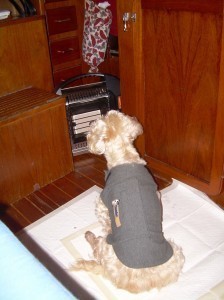
And now I'm here with my little dog Chip (who likes to sit in front of the propane heater on these cold nights) and I'm reveling in the abundance of beauty out here.
Yes, I also have stories to tell, that's for sure. The only time sailors have stories to tell is when the s#@t hits the fan. There was the time my anchor hooked the shrimpers' hurricane line in Skull Creek, or when I entered the Savannah River at high tide and passed over an 8 foot patch when I had 8.5 feet of tide under me. In essence, I just drove over dry land. Or the time I carried my dog up the 250-foot dock leading from the boat to dry land and suddenly, I felt the side of my turtleneck sweater and jeans were soaked. He couldn't make it to the head of the dock so he peed all over me.
But I also have stories of the wondrous beauty of the waterway, motoring along at either 3.7 or 7.2 knots, depending on the state of the tide and the direction of the current, and getting a semi-voyeuristic peek into the window of the houses on either side, waving to the girl with two black labs throwing a stick for them to swim after, or eating dinner with the couple of strangers who invited me to their dock for two nights, for dinner, and for a day's sightseeing tour of Beaufort, SC.
I have so much to be grateful for.
If you are willing to slow down for about ten minutes, I hope you will watch this video by the amazing cinematographer and photographer, Louie Schwartzberg who says in the film that he got into photography because he had ". . .time and a sense of wonder . . ."
It is much easier to see the beauty in a new-to-you place when you are schedule-less. But as writers, we must always be in touch with that sense of wonder whether it is an anchorage we are exploring for the first time, or the hundredth time we've watched the sun set over the marina from the comfort of the cockpit. Without that sense of wonder, you won't be able to bring your readers along with you.
Fair winds!
Christine
author of the sailing thriller CIRCLE OF BONES
available ($3.99) for Kindle and Nook
Share on Facebook
January 12, 2012
The K.I.S.S. approach to cruising…
C.E. Grundler
Last Friday, Christine posted Slow down, where she reflected on the virtues of proceeding at a more relaxed pace and taking time to appreciate the simpler beauties that rushing may cause us to overlook. And when she spoke of tying up in Osprey Marina and what she discovered there, it brought to mind a cruise I'd taken many years ago and the lesson I learned along the way – a lesson that has stayed with me ever since.
It wasn't much of a cruise, really, just a short getaway. Our daughter was small and my parents offered to watch her for a week, so my husband and I threw a dufflebag of clothes and an ice-chest of coldcuts, soda and bagels onto our 23' cuddy-cabin and set out for adventure… or at least a few days to ourselves. And let me tell you, we were cruising in style. Amenities consisted of vee-bunks beneath a deck that leaked (some things never change) a porta-potti, and the aforementioned ice-chest. Instruments consisted of a compass, VHF and a depth finder that read 'ERR' whenever the water got skinny, and we had a stack of paper charts. That was it. This was before the time of GPS on shiny tablets, cells phones and all the other bells and whistles that many couldn't imagine leaving the dock without these days.
And yet, aboard that little boat we traveled to some wonderful locations. There was no set cruise plan; we picked a spot, set out, and since the boat itself hadn't drained our budget we were able to tie up in some very nice marinas each night. With a boat that small, there was never need to call ahead; they'd always find some spot to tuck us in, and transient fees were minimal. At Mystic Seaport we found ourselves placed into a slip meant for a boat three times our size, surrounded by vessels we could only dream of, towering over us quite comically.
The couple to our port side were lovely people, liveaboards with a well-used boat and countless miles beneath their keel. The couple in the shiny new ketch to starboard, with the TV flickering and the AC humming, however… well, let's just say HE wanted that *@%! boat, and SHE wanted to spend that money remodeling the kitchen… and needless to say, neither of them were happy. With the way sound carries through fiberglass hulls and water in the quiet hours of the night, we all knew just how unhappy they were. He kept raising the volume on the TV, and she kept raising her volume to match. My husband had gone down the road in search of ice to replenish our cooler, and I was about to go over and say something when the fellow to port had a word with starboard about keeping it down. And when my husband returned, he looked to starboard and remarked about 'someday, a boat like that," I let him know not everything about that boat was as shiny as it might appear. And while that couple stayed below with all their fine amenities and their resentment, we ate our cold sandwiches in the cockpit, then wandered the now silent, darkened Seaport filled with magnificently restored square riggers, schooners and sloops, sitting ghostly in the moonlight.
That little boat took us many places, on that cruise and others, and through it all I came to appreciate the freedom that came from keeping things simple. We could tie up just about anywhere, and occasionally we even skipped the baloney sandwiches for dinner in some very nice restaurants. And when we chose the trawler we have now, we intentionally sought something on the small and simple end of the scale. Yes, it's nice to have an enclosed head, a real stove and standing headroom, but 32' still leaves us the ability to cruise in the style to which we've become accustomed… at least, once we're back off the hard, that is!
And for a bit more on really K.I.S.S. boating, a 'build your own' video, (it's funny how much these engines sound like my diesel,) as well as a wonderful demo video of the boat pictured above, (sorry, no subtitles, but I do love that this guy is wearing an 'Eight Heads in a Dufflebag' tee-shirt!): Ponyo Pop-Pop Boat
Share on Facebook


